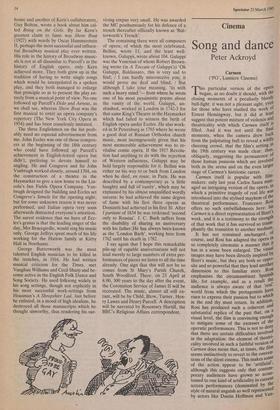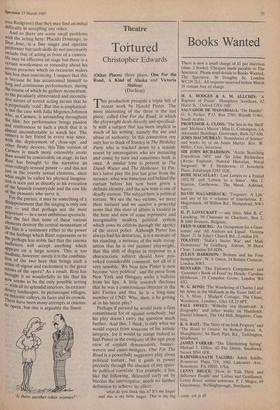Cinema
'Song and dance
Peter Ackroyd
Carmen (`PG', Lumiere Cinema) This particular version of the opera began, as no doubt it should, with the closing moments of a peculiarly bloodY bull-fight: it was not a pleasant sight, eve°, for those who have studied the work of Ernest Hemingway, but it did at least, suggest that potent mixture of violence and theatricality with which Carmen itself is filled. And it was not until the final moments, when the camera drew back from the palpitating bull to reveal a wildly cheering crowd, that the film's setting in the 19th century was made clear: thus, obliquely, suggesting the permanence °f those human passions which are involved both in the arena and on the even larger stage of Carmen's histrionic career. Carmen itself is popular with film- makers: only last year Carlos Saura man- aged. an intriguing version of the opera, in w. hich a primitive tragedy of real life was Introduced into the stylised mayhem of the theatrical performance. Francesco Res.1 offers no such embellishments here: his Carmen is a direct representation of Bizet ,us work, and it is a testimony to the strength of that work that it has survived so trial' phantly the transition to another medium. It has not remained unchanged, of course, and Rosi has adapted the opera in so completely cinematic a manner that it h. as in a sense been enlarged. The visual images may have been directly inspired by Bizet's music, but they are both so opPo" site and so powerful that they lend another dimension to this familiar story. Ile. sj,„ emphasises the circumambient Spays'. life, for example, and as a result the audience is always aware of that 'real world from which the protagonists have risen to express their passion but to which in the end thy must return. In addition, Rosi has produced such a coherent and substantial replica of the past that, on a visual level, the film is convincing enough to mitigate some of the excesses of the operatic performances. This is not to deny that there are certain difficulties involved in the adaptation: the element of theatri cality involved in such a faithful version of Carmen does mean that, at times, the film seems instinctively to revert to the conven- tions of the slient cinema. This makes some of the action appear to be `artificial'' although this suggests only that contem- porary audiences have grown so accus. tomed to one kind of artificiality in current screen performances (dominated by the style of natural anguish so well represented by actors like Dustin Hoffman and Van-
essa Redgrave) that they may find an initial difficulty in accepting any other.
And so there are some small problems with the acting here: Placido Domingo, as Don Jose, is a fine singer and operatic performer but such skills do not necessarily include that of acting in front of a camera. He may be effective on stage but there is a certain woodenness or rotundity about his screen presence which on occasions makes him less than convincing. I suspect that this is because he has accustomed himself to long and continuous performances, during the course of which he gathers momentum, SO the peculiarly abbreviated and inconclu- sive nature of screen acting means that he Is Perpetually 'cold'. But this is emphatical- ly not the case with Julia Migenes-Johnson Who, as Carmen, is astounding throughout the film: her performance brings passion and restlessness to such a pitch that it is almost uncomfortable to watch her. The camera is her friend in every way since, With the deployment of-,`close-ups' and other fleshy devices, this.'film version of Carmen is much more ostensibly erotic than would be conceivable on stage. In fact Rosi has brought to the narrative an Over-ridingly sensual power — and this not last in the overtly sexual elements, since what might be called his physical imagina- tion is seen just as directly in his evocation of the Spanish countryside and the raw life of the peasants who serve it. For the purists, it may be something of a disappointment that the singing is only one part — and that perhaps not the most Important — in a most ambitious spectacle. But the fact that none of these various elements destroy the central momentum of the film is a testimony either to the power of the feelings which Bizet represents or to the perhaps less noble fact that the cinema audiences will accept anything which appears on a large screen. This is too dualistic, however: surely it is the combina- tion of the two here that brings such a sense of vigour and excitement to the great scenes of the opera? As a result, Rosi has brought it so wonderfully to life that his now seems to be the only possible setting With all its splendid interiors, its extraor- dinary landscapes, its picturesque villages, as majestic valleys, its faces and its crowds. There have been many attempts at cinema- tic opera, but this is arguably the finest.
'Is there another other woman?'















































 Previous page
Previous page